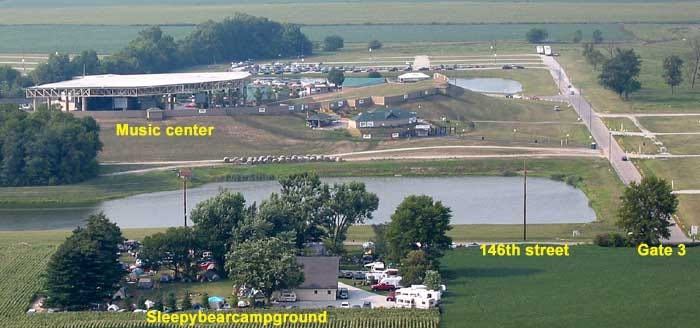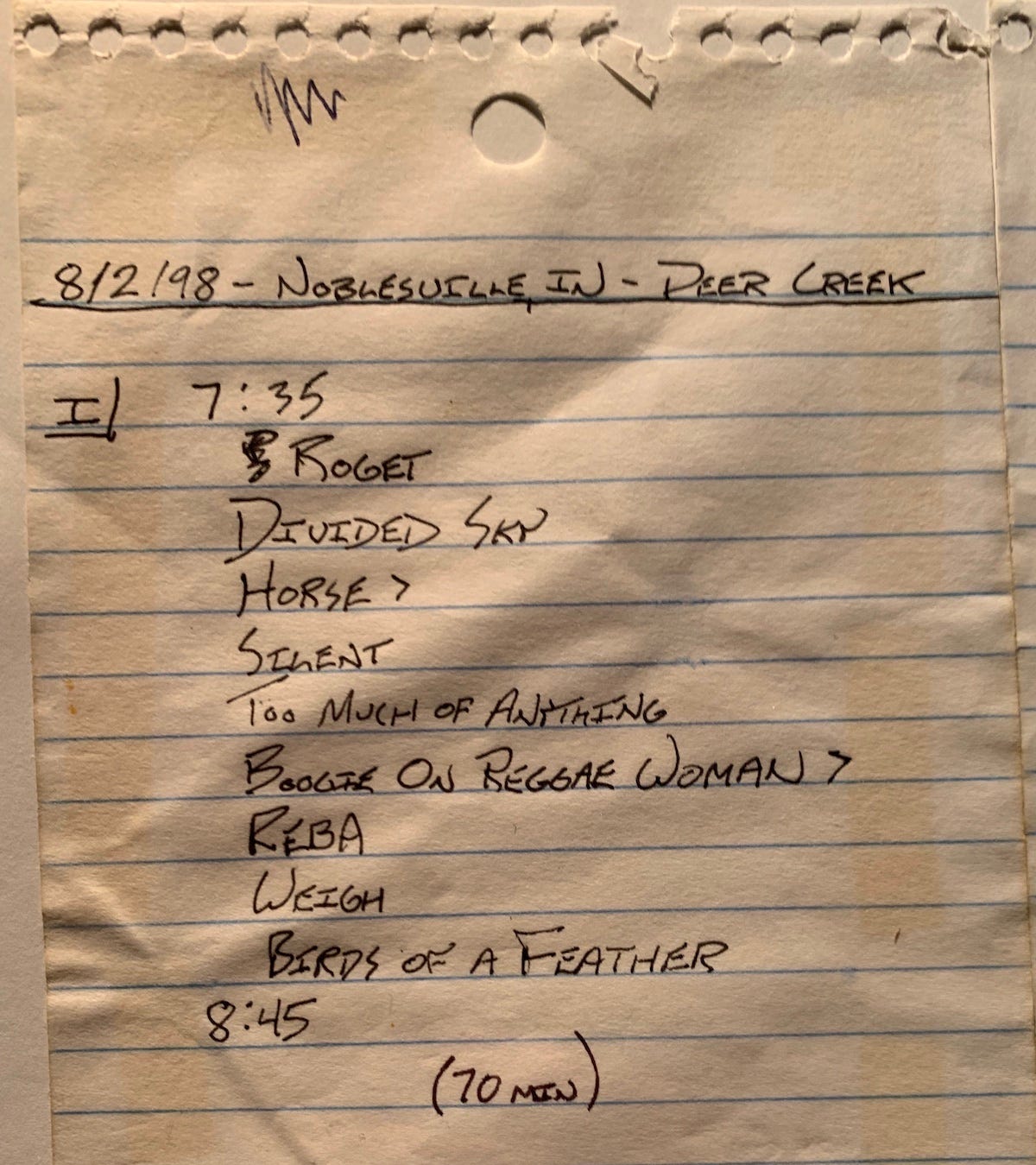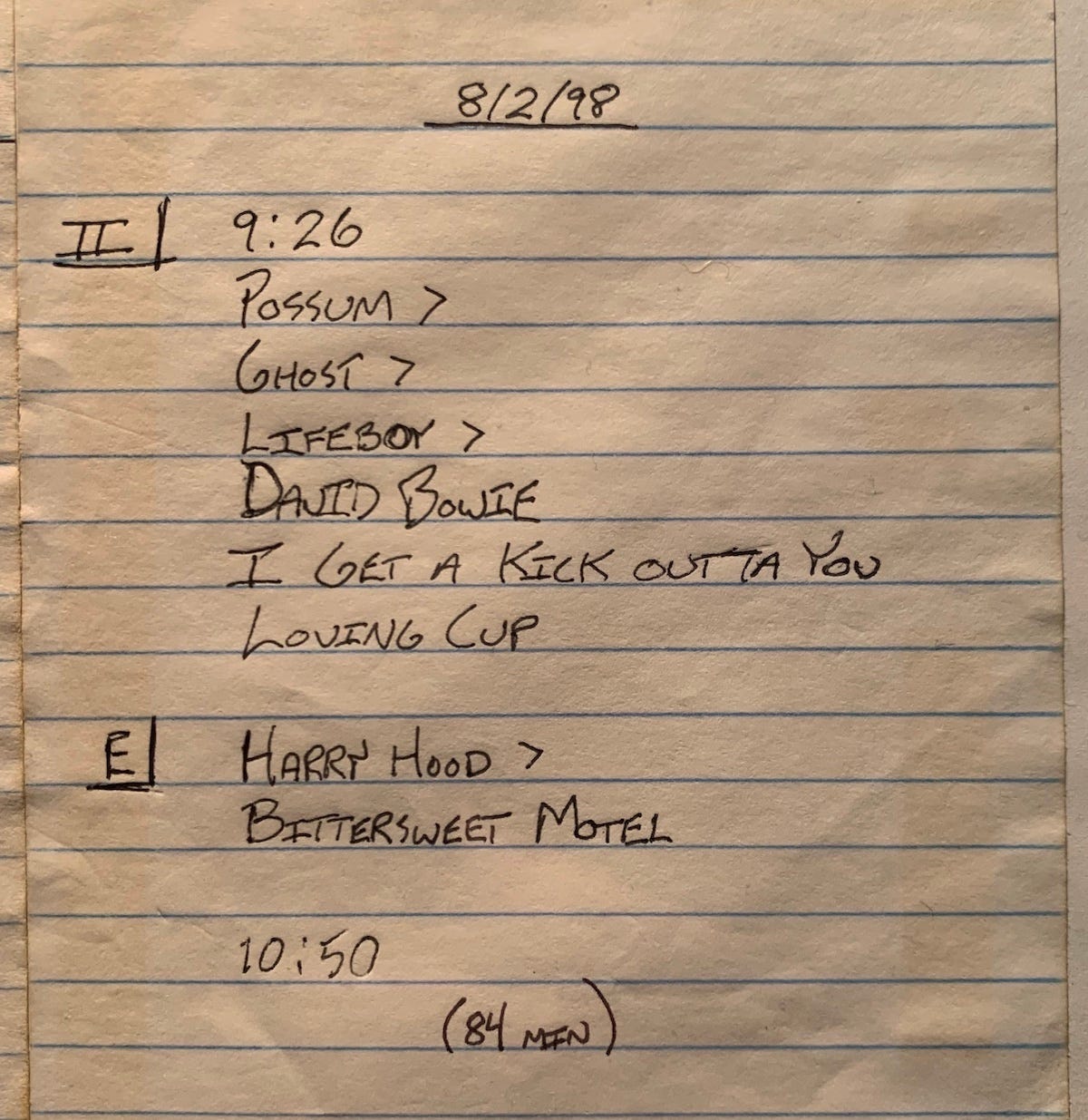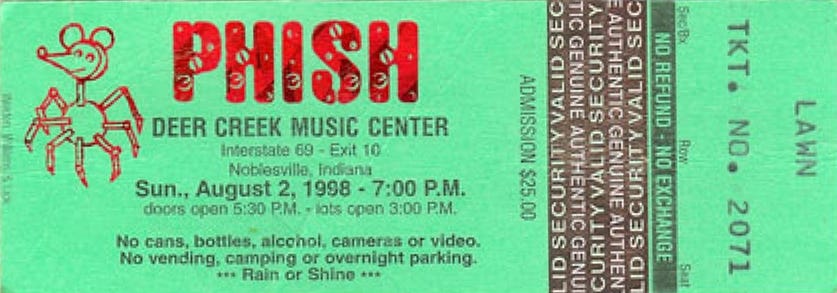Midwest Nice
8/2/98, Noblesville, IN, Deer Creek Music Center
SET 1: Roggae, Divided Sky, The Horse > Silent in the Morning > You Better Believe It Baby, Boogie On Reggae Woman > Reba, Weigh > Birds of a Feather
SET 2: Possum > Ghost > Lifeboy > David Bowie, I Get a Kick Out of You, Loving Cup
ENCORE: Harry Hood > Bittersweet Motel
Listen on phish.in
Midwesterners can be empathetic, almost to a fault. So it makes sense that Deer Creek – the only Midwestern venue played by Phish every year between 1995 and 2000 – would be so effective a mirror for reflecting the current state of the band each time they pass through Noblesville. In 1995, it was the brash, shed-conquering version of Phish approaching its first apex. In 1996, it was the mixed-up, delicate group searching in many directions for its next step. In 1997, it was spooky and paranoid as they tentatively started to put some pieces together. And looking forward, 1999 and 2000 will be increasingly manic episodes that squeezed some of the last drops of fun out of accelerating entropy.
Here in 1998, the two-night run in the cornfield is absolutely sopping with the chilled-out mood of the summer tour that surrounds it. It eases into the pool with the deliberate pace of an octogenarian, not fully revving up until almost an entire set has passed. If the now-nightly cover debut can be read like a mood ring, well this show features a 1934 Cole Porter jazz vocal popularized by Frank Sinatra and Ethel Merman smack in the middle of the second set. It’s a show you can take home to your Midwestern Grandma.
The tone is set from the very beginning by Roggae, which is a million miles (and a few dozen decibels) away from the previous night’s opener. Roggae has sneakily become one of the most played songs from the still-upcoming new album, its nine performances this summer just trailing BOAF and Moma Dance and beating out Ghost, Limb, and Water in the Sky. Despite sounding almost too fragile for the big crowds of the outdoor season, Roggae is neatly symbolic for where Phish found themselves at the time: trading lead vocals within verses, patiently developing short melodic lines, building to a firm murmur instead of a deafening roar.
It’s a song that pairs well with an opener from another mother: the next night’s one-off performance of the Smashing Pumpkins’ “Rhinoceros,” which I’m going to jump ahead and cover here because I have something even better to write about in tomorrow’s essay. Rhinoceros gets an inverse crowd cheer to the Alpine Ramble On, as instead of a rolling roar of recognition it’s a huge build-up freakout that jump-cuts to complete bafflement. I can’t pretend to be the cool guy in the pavilion who got it either (that will have to wait for 7/21/99); somewhere around the first “and she knows and she knows” I placed it as something off Gish, but couldn’t immediately remember the name.
And speaking of 7/21/99, Phish has kind of a sketchy record with covering “contemporary” alternative/indie rock songs. But holy crap, did they nail Rhinoceros, with Trey doing a great job of recreating Billy Corgan’s “army of guitars” studio sound all by his lonesome. As a whole, Phish fits surprisingly well into the psychedelicized sorta-shoegaze of the Pumpkins, building from those quiet, gentle verses to the Big Rawk Solo Bridge at 4:10 to the ending, which focuses on the simple repetition of one killer riff…as much as Trey wants to spin out into a solo, he resists. They should bring it back! If they bring it back this week at MSG, I get the credit.
Rhinoceros is definitely not a song Phish could’ve or would’ve covered in 1991 when Gish came out, and it’s songs like Roggae that have unlocked those abilities in 1998. Consider the structure of Roggae: quiet verses, power-chord bridge, starry-eyed ending focused around a repetitive guitar melody. It’s the same playbook as Rhinoceros and a bunch of other Pumpkins songs, even if nobody’s ever gonna confuse a Corgan composition for an Anastasio/Fishman/Gordon/McConnell/Marshall*.
It’s a slow build structure that Phish has explored more often lately, with Piper being the purified form, but also through songs like Dirt or Prince Caspian. Previously, if there was a gradual ramp up in a Phish song, it’d be the jam section after they’ve navigated a prerequisite proggy intro, as in Reba or Hood or Slave. Or it’d be a “slow build” pushed to absurdity, such as Sparkle. In their calmer, less show-offy maturity – and perhaps with a little bit of Trey’s indie rock tastes creeping in – Phish are more willing to settle in and construct an entire song out of this structure by 1998.
And occasionally they can stretch the slow build model across an entire show too. As I said, the first night of Deer Creek takes a looooong time to get up to speed, and that’s not detrimental – everything from Roggae through Weigh feels like a prolonged sunset. After dark, it builds in intensity (aside from a brief philosophical break in Lifeboy) until Bowie explodes into a flurry of teases, neatly reprising portions of the preceding setlist and tying the whole room together. Then it fades back to silence with the lullaby ending of a Hood > Bittersweet Motel. It’s the kind of chill summer evening that Midwesterners can understand. But if you want to do something else, ope, well, that’s fine with us too!
* - I can hear Billy whining “the circus is the place for me,” though. And now I bet you can too.





Also, re: Rhinoceros, not only did they absolutely nail it, but I will never be able to separate that performance from this story in one of the Pharmer’s Almanacs: https://imgur.io/uDKGmWx
Another fun Roggae/Roget fact was we all thought this was the name of Frankie Says for the three months between its 4/2 debut and when it and the real Roget/Roggae were played in Copenhagen. Can’t recall when/where he said/posted this story, but according to Tom Marshall, he missed 4/2 (or at least the Frankie), someone asked him what the name of the (non-BOAF) debut was, and based on the description he was given, he guessed it was Roggae.